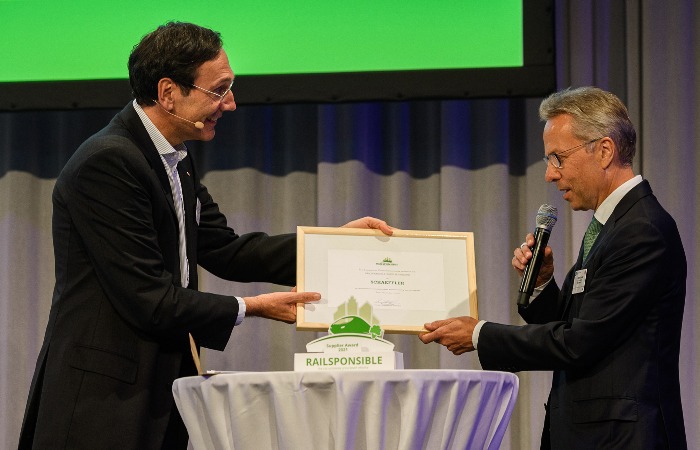
Schaeffler wins Railsponsible Supplier Award 2021
Schaeffler, the world’s leading automotive and industrial supplier, has received the Railsponsible Supplier Award 2021 in the “Climate Change and Circular Economy” category for its 100 percent return service for axlebox bearings. The award was presented at the 2021 Railway Forum, Europe’s top railway industry conference, in Berlin. Railsponsible is a sustainability initiative by the railway industry that fosters and celebrates outstanding environmental and social practices on the part of suppliers. Dr. Stefan Spindler, CEO Industrial at Schaeffler, accepted the award on behalf of the company from Dr. Levin Holle, CFO of Deutsche Bahn AG, in Berlin on September 7. “Our 100 percent return service makes sense both environmentally and commercially,” he told the audience. “It combines our proven technology for reconditioning rolling bearings with the latest advances in data exchange and the use of digital twins.” Double benefit: Reconditioning bearings reduces both costs and CO2 emissions The 100 percent return service for axlebox bearings enables rail transport operators to significantly increase the availability of their rail vehicles, while maximizing mileage and hence reducing CO2 emissions.
As part of this service, Schaeffler carries stocks of reconditioned spares, combining the cost savings from bearing reconditioning and reuse with the time savings made possible through immediate availability.
Using reconditioned axlebox bearings is much less resource and carbon intensive than manufacturing new bearings. Specifically, it cuts CO2 emissions by over 95 percent, energy consumption by 94 percent, and water consumption by 96 percent. For example, in a freight train with 80 wagons, two locomotives and 1,296 axlebox bearings, this circular approach saves 133 metric tonnes of CO2, 481 MWh of energy and 1,767 m³ of water.
Data matrix code is the key to digitalized condition-based maintenance Central to Schaeffler’s 100 percent return service is a unique data matrix code (DMC) that is etched onto each axlebox bearing during manufacturing. The DMC can be used to capture important manufacturing, operating and maintenance data for each product over the course of its service life, creating a comprehensive digital twin. Thanks to their special design, Schaeffler axlebox bearings have the potential to operate for very long periods between maintenance runs. The digital twin is the key to realizing this potential, enabling condition-based maintenance, which in turn means better operational safety and reliability.
Schaeffler Group is a leading global supplier to the automotive and industrial sectors, the Schaeffler Group has been driving forward groundbreaking inventions and developments in the fields of motion and mobility for over 70 years. With innovative technologies, products, and services for CO?-efficient drives, electric mobility, Industry 4.0, digitalisation, and renewable energies, the company is a reliable partner for making motion and mobility more efficient, intelligent, and sustainable. The technology company manufactures high-precision components and systems for powertrain and chassis applications as well as rolling and plain bearing solutions for a large number of industrial applications. The Schaeffler Group generated sales of approximately EUR 12.6 billion in 2020. With around 83,900 employees, Schaeffler is one of the world’s largest family companies. With more than 1,900 patent applications in 2020, Schaeffler is Germany’s second most innovative company according to the DPMA (German Patent and Trademark Office).
On stage for the presentation of the 2021 Railsponsible Supplier Award at the 2021 Railway Forum in Berlin on September 7: (ltr) Dr. Levin Holle, CFO at Deutsche Bahn AG, Stephan Pfuhl, Head of Supply Chain Management at SBB, Dr. Stefan Spindler, CEO Industrial at Schaeffler AG, Marcus Eisenhuth, President Industrial Europe at Schaeffler AG and Dr. Michael Holzapfel, Senior Vice President Rail – Industrial Europe at Schaeffler AG. All applicable sanitation requirements for the containment of the corona pandemic were met.


 +91-22-24193000
+91-22-24193000 Subscriber@ASAPPinfoGlobal.com
Subscriber@ASAPPinfoGlobal.com